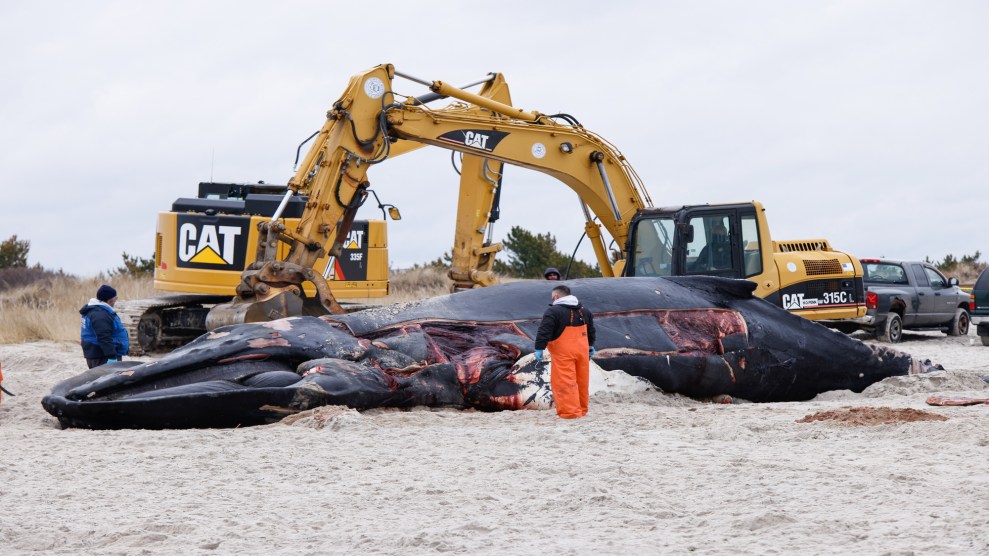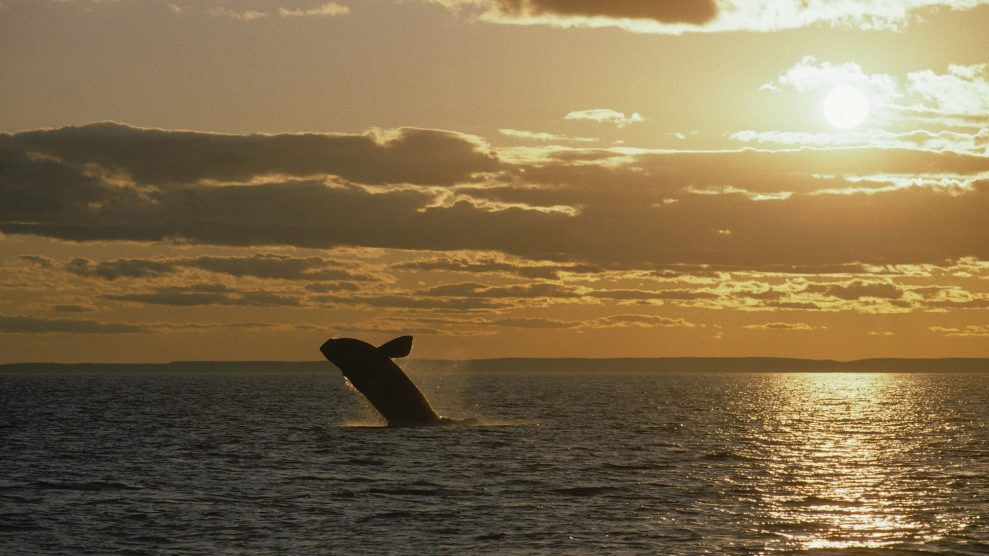
A humpback whale washed up on the shore of Lido Beach in Long Island, New York, on January 31, 2023.Kena Betancur/Getty
This story was originally published by the Guardian and is reproduced here as part of the Climate Desk collaboration.
Thousands gathered at New Jersey’s Point Pleasant beach on Sunday with a united mission: to pause offshore wind projects in response to recent whale deaths along the New York-New Jersey coast.
The gathering unfolded even as officials dispute the notion that the projects may be to blame for the dead whales, a controversy that—like many—is breaking along political party lines.
Holding signs reading “Save the Whales” and “Whale Lives Matter” on Sunday, World Whale Day, a coalition of ocean conservationist groups and homegrown activists argued that local wind turbine survey projects were harming marine wildlife. “You are the ocean’s voice,” said organizer Cindy Zipf, encouraging protesters to get in touch with their local officials.
Since 2023, at least 10 whales have washed ashore on the New York and New Jersey coastlines. Last Monday, a ninth humpback whale was found dead in Manasquan, New Jersey. The National Oceanic and Atmospheric Administration (NOAA) fisheries division, which investigates such whale deaths, has called them “unusual mortality events.”
As organizers at Sunday’s protest argued for a moratorium on wind turbines in the area, others say there is no evidence to support claims that wind turbines are the cause of the whale deaths.
Many raising alarms on recent whale deaths have pointed to noise created by offshore wind survey work as confusing the whales’ navigation systems. But scientists argue that current evidence does not support such a claim. “It’s just a cynical disinformation campaign,” Greenpeace oceans director John Hocevar said to USA Today.
And even though the agency considers the whale deaths unusual, a statement from NOAA fisheries officials added: “[T]here is no evidence to support speculation that noise resulting from wind development-related site characterization surveys could…cause mortality of whales, and no specific links between recent large whale mortalities and currently ongoing surveys.”
NOAA fisheries research on the 183 total whale deaths found that 40 percent of them resulted from human interaction, either from ship strikes or netting entanglement.
Many attendees of Sunday’s rally are locals to the New Jersey coast and say they came out to express their concern. “I’ve gotten lots of information from different sources, and you can’t argue with the fact that 10 whales have washed up,” said Kim Wetzel, 57, an Ocean City resident.
Wetzel works in a primary school and became involved through whale advocacy work in Ocean City. “Even though we don’t have the facts yet, the facts will come—but we’re seeing the evidence with our own eyes,” Wetzel said.
“Also, what’s real is common sense,” Michelle Gehring, a stay-at-home mom, also from Ocean City, added.
Gehring said that outside whales, residents of Ocean City were complaining that offshore wind projects were causing their houses to shake. Both felt that more time and research was needed to understand how offshore wind projects affect the environment.
Others came to the protest via friends and local Facebook groups. “I’m trying to educate myself,” said Casey Small, a teacher who lives in Cape May, almost two hours away from Sunday’s rally.
Small said many participants did not seem to have evidence on the survey’s exact impact. “What I’m finding is a lot of people don’t really know what’s going on,” Small said. “We don’t really have a lot of information on it. I think it’s important to have concrete evidence. I’m learning that it’s really hard to find.”
Trisha Devoe, a whale-watching naturalist, organized Sunday’s rally and became involved after learning about recent humpback whale deaths. “You have to stop and say, ‘Is it contributing to these deaths’?” said Devoe, who wants more studies on the whale deaths.
Zipf, who has organized for decades with her group Clean Ocean Action, said organizers originally supported a pilot project for wind turbines. But they have grown concerned as larger projects develop without a complete understanding of the turbines’ ecological impact.
“[People] are outraged because they feel like they weren’t told that this has been happening,” Zipf said. “All of a sudden, their ocean is being turned into a giant power plant.”
Politicians also participated in Sunday’s event. The New Jersey congressman Chris Smith, a Republican who represents Point Pleasant, echoed calls for a moratorium on wind turbine projects. Smith, who said he supports clean energy where viable, has introduced a bill for the federal General Accountability Office to determine how well the environmental impact statements on wind development projects were done.
“It hasn’t been looked at strongly for those who are about the benefits financially,” Smith said. “That brings a healthy skepticism to people like myself who think, ‘I don’t get anything out of this. I just want a clean ocean’.”
Discussions around whale deaths have become increasingly partisan. Arguments that windfarms are harming whales is a talking point that has been parroted by conservative politicians and figures, including far-right Georgia congresswoman Marjorie Taylor Greene and Fox News host Tucker Carlson.
But many at Sunday’s rally said the issue, for them, wasn’t political. “It’s very frustrating that this has become a partisan issue because the ocean has always been and always will be nonpartisan,” Zipf said. “We all depend on a clean and healthy ocean.”














